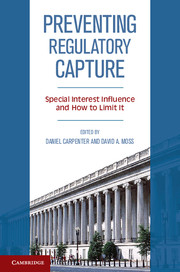Book contents
- Frontmatter
- Contents
- List of Figures
- List of Tables
- Editors
- Contributors
- Preface
- Acknowledgments
- Introduction
- Section I Failures of Capture Scholarship
- 1 A Revisionist History of Regulatory Capture
- 2 The Concept of Regulatory Capture
- 3 Detecting and Measuring Capture
- Section II New Conceptions of Capture – Mechanisms and Outcomes
- Section III Regulatory Case Studies
- Section IV The Possibility of Preventing Capture
- Conclusion
- Afterword
- Index
- References
1 - A Revisionist History of Regulatory Capture
Published online by Cambridge University Press: 05 June 2014
- Frontmatter
- Contents
- List of Figures
- List of Tables
- Editors
- Contributors
- Preface
- Acknowledgments
- Introduction
- Section I Failures of Capture Scholarship
- 1 A Revisionist History of Regulatory Capture
- 2 The Concept of Regulatory Capture
- 3 Detecting and Measuring Capture
- Section II New Conceptions of Capture – Mechanisms and Outcomes
- Section III Regulatory Case Studies
- Section IV The Possibility of Preventing Capture
- Conclusion
- Afterword
- Index
- References
Summary
The idea of regulatory capture has controlled discussions of economic regulation and regulatory reform for more than two generations. Originating soon after World War II, the so-called capture thesis was an early harbinger of the more general critique of the American regulatory state that dominated the closing decades of the twentieth century. The political ramifications of that broad critique of government continue to be felt today both in the resilient influence of neoliberal policies such as deregulation and privatization as well as in the rise of more virulent and populist forms of anti-statism. Indeed, the capture thesis has so pervaded recent assessments of regulation that it has assumed something of the status of a ground norm – a taken-for-granted term of art and an all-purpose social-scientific explanation – that itself frequently escapes critical scrutiny or serious scholarly interrogation.
This chapter attempts to challenge this state of affairs by taking a critical look at the emergence of regulatory capture theory from the perspective of history. After introducing a brief account of the diverse intellectual roots of the capture idea, this chapter makes three interpretive moves. First, it suggests that, to a large extent, capture theory relies on a short and increasingly outmoded history of American regulation that is out of synch with the latest accounts of the development of the American regulatory and administrative state. Second, it questions just how “new” the insights of capture theory ever really were or are. Although earlier generations of American political thinkers and regulatory reformers did not use the language of “capture” per se, they were exceedingly well-versed in the general notion that democratic and republican institutions of government were prone to the corruptions of private interest. Finally, this chapter documents the degree to which progressive regulatory initiatives were themselves oriented toward the control of undue corporate and private influence in democratic and public life. It closes by suggesting that some of those original progressive explorations of the ongoing problem of private coercion in a democratic republic continue to provide a more satisfactory account than capture theory of the new configurations of public and private power that dominate early twenty-first century American life.
- Type
- Chapter
- Information
- Preventing Regulatory CaptureSpecial Interest Influence and How to Limit it, pp. 25 - 48Publisher: Cambridge University PressPrint publication year: 2013
References
- 14
- Cited by



